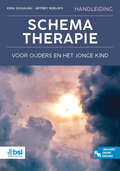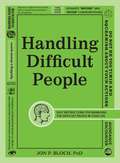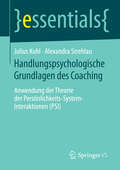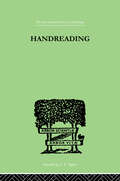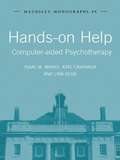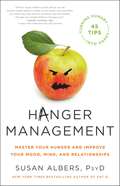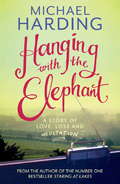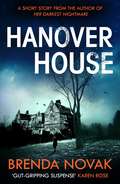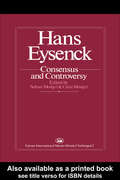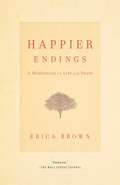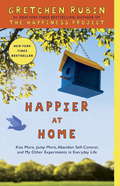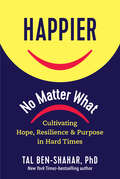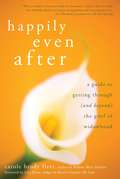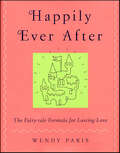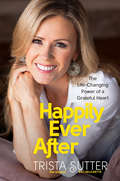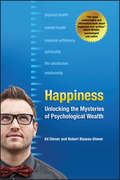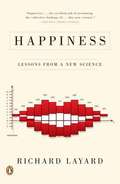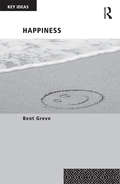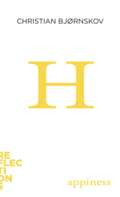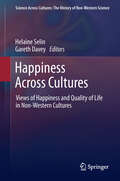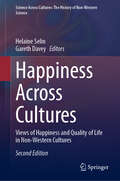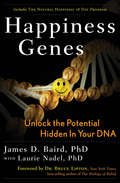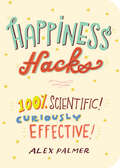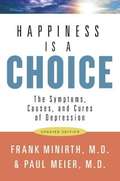- Table View
- List View
Handleiding schematherapie voor ouders en het jonge kind
by Jeffrey Roelofs Esra SchuilingDit boek helpt therapeuten stap voor stap gezinsgerichte schematherapie te geven. Het boek is primair bedoeld voor therapie bij ouders met jonge kinderen (0-5 jaar), maar de oefeningen in het boek kunnen net zo goed toegepast worden bij ouders van oudere kinderen in andere ontwikkelingsfasen. Deze behandelmethode is zowel toepasbaar bij groepstherapie als individuele therapie. Bij dit therapeutenboek hoort een apart werkboek voor ouders. Handleiding schematherapie voor ouders en het jonge kind biedt een duidelijk theoretisch kader voor gezinsgerichte schematherapie voor ouders in de fase van pril ouderschap. Dat doet het aan de hand van het ontstaan van vroegkinderlijk onaangepaste schema’s, met de basisbehoeften van ouder en kind als rode draad. Het boek beschrijft helder, concreet en met veel casuïstiek het protocol voor ouders met persoonlijkheidsproblematiek. Het boek bespreekt verschillende toepassingen van schematherapie voor ouders die is gericht op het doorbreken van intergenerationele hechtingsproblematiek. Ten slotte staat het ook stil bij de mogelijke valkuilen en moeilijkheden van schematherapie voor ouders. Daarmee is het een geschikte therapie voor alle (aanstaande) ouders en gezinnen – in welke vorm dan ook.
Handling Difficult People: Easy Instructions for Managing the Difficult People in Your Life
by Jon P BlochPractical advice for interacting with toxic personalities.At one point or another, you'll encounter someone who is inconsiderate, irate, or aggressive and you'll need to know how to effectively manage the situation. Handling Difficult People helps you deal with the toxic personalities in all areas of your life, including in the workplace, at home, and during everyday interactions. Inside, you'll find the strategies and tools you need to spot the ten most common personality types and information on why these people behave in such an irritating manner. This book also teaches you what you should do when you're confronted by a difficult person as well as how to avoid these types of people altogether.With the time-tested advice and techniques in Handling Difficult People, you'll confidently manage any toxic situation--and learn what you can do to help yourself.
Handling Difficult People: How to recognize, analyze, approach, and deal with difficult people
by Jon P BlochLet’s face it: Some people rub you the wrong way. It could be something they do, something they don’t do—or you may not be able to put your finger on it. Handling Difficult People is an engaging, easy-to-read reference full of examples to aid you in dealing with the troublesome people in your life. With this practical guide, you’ll develop the skills you need to handle anyone in any situation…and come out on top.
Handlungspsychologische Grundlagen des Coaching: Anwendung der Theorie der Persönlichkeits-System-Interaktionen (PSI) (essentials)
by Julius Kuhl Alexandra StrehlauCoaching fördert die Entwicklung der Selbststeuerungsfähigkeiten des Klienten, die für die Lösung eines Problems oder die Erreichung eines (meist) beruflichen Ziels bedeutsam sind. In diesem Beitrag wird die Persönlichkeits-System-Interaktions-Theorie (PSI-Theorie) dargestellt, mit der verschiedene Persönlichkeitstheorien, wissenschaftliche Befunde und neurobiologische Grundlagen zu einer Theorie der willentlichen Handlungssteuerung verbunden werden. Mit Hilfe der PSI-Theorie können nicht nur Prozesse der Selbststeuerung theoretisch erklärt werden, sondern sie bietet auch eine Grundlage dafür, das professionelle Handeln im Coaching systematisieren und definieren zu können.
Handreading: A STUDY OF CHARACTER AND PERSONALITY
by Laffan, M NFirst Published in 1999. Routledge is an imprint of Taylor & Francis, an informa company.
Hands-on Help: Computer-aided Psychotherapy (Maudsley Series)
by Kate Cavanagh Isaac M. Marks Lina GegaHands-on Help is a narrative review of the mushrooming field of computer-aided psychotherapy for mental health problems as a whole, from the time it began in the 1960’s through to the present day. The many types of computer-aided psychotherapy and how each might be accessed are detailed together with the pros and cons of such help and the functions it can serve. The authors review prevention as well as treatment. The book describes and summarizes 97 computer-aided self-help systems in 175 studies according to the types of problem they aim to alleviate. These include phobic, panic, obsessive-compulsive and post-traumatic disorders, depression, anxiety, eating disorders, sexual problems, smoking, alcohol and drug misuse, schizophrenia, insomnia, pain and tinnitus distress, and childhood problems such as encopresis, autism and asthma. Within each type of problem the systems are described according to whether they are used on the internet, CD-ROM, phone, handheld or other device. The final chapter shows how internet self-help systems with phone or email support allow clinics to become more virtual than physical. It also discusses methods of screening suitability and of supporting users, constraints to delivery, uptake and completion, cost-effectiveness, and the place of computer-aided self-help in healthcare provision. This informative book will be essential reading for psychiatrists, psychologists and all other mental health professionals interested in broadening their understanding of computer-aided psychotherapy.
Hanger Management: Master Your Hunger and Improve Your Mood, Mind, and Relationships
by Susan AlbersThe complete program for mastering your "hanger," from mindful-eating pioneer Dr. Susan Albers -- with 45 tips to turn hanger into happiness. It happens to all of us. One minute you're happily going about your day, and a few seconds later you're a snappy, illogical version of yourself. The culprit? Hanger. We're living busier lives than ever before, and when we forget to eat -- or accidentally overeat -- hunger can make us angry, unreasonable, and dull, with big impacts on our emotional and psychological well being. And hanger can become a cycle. When we get too hungry, we're more likely to make food decisions we regret, which sets us up for another hanger crash later on. The good news: when we make better decisions about food, we think more clearly, connect better in our relationships, and improve our performance. Hanger Management is the book that can help you break this cycle and create healthy habits that fuel and empower you.In Hanger Management, New York Times bestselling author and clinical psychologist Susan Albers sheds light on the causes of hanger, and shares 45 of her best tips for managing it well. By learning to stay on top of your hunger cues, cultivating a better understanding of your appetite, and creating a better overall relationship with food, you'll become happier -- and healthier -- for life.
Hanging with the Elephant: A Story of Love, Loss and Meditation
by Michael HardingIn his new book, Hanging with the Elephant, writer Michael Harding is back in Leitrim in the north-west of Ireland. His wife has left for a six-week trip to Poland and he is alone for the first time since his illness two years earlier. Faced with this time on his own, Harding resolves to examine the threat of depression that is a constant presence in his life and his dependency on his wife, the beloved, since his illness. But, as he attempts to tame the 'elephant' - an Asian metaphor for the unruly mind - he finds himself drawn back to the death of his mother during the summer of 2012. Written with unflinching honesty, Hanging with the Elephant begins as one man's quest to overcome his demons, but becomes a journey into the depths of the soul, where we are given a glimpse of the one thing that holds us all.
Hanover House: (Evelyn Talbot series, Book 0.5) (Evelyn Talbot)
by Brenda NovakThis is SILENCE OF THE LAMBS meets Karen Rose...The stunning prequel to New York Times bestseller Brenda's Novak latest thriller Her Darkest Nightmare, described as 'gut-gripping suspense' by Karen Rose, introduces new series lead Dr Evelyn Talbot. Welcome to Hanover House...Psychiatrist Evelyn Talbot has dedicated her life to analysing psychopaths. Why they act as they do. How they come to be. Why they don't feel remorse. Her only goal is to use her knowledge to find and stop them. Having been tortured and left for dead when she was just a teenager by her high school boyfriend, Evelyn's determined to understand how someone she trusted so much could turn on her. Establishing a revolutionary new medical health centre in the remote town of Hilltop, Alaska, where she observes these killers is the final step in years of studying which will give her the answers she needs. Keeping these killers inside and the residents of Hilltop safe is Evelyn's responsibility, but it will only take one little thing to go wrong for the danger they pose to become all too real...Look for the other gripping novels in the Evelyn Talbot series - Her Darkest Nightmare, Hello Again, and Face Off, available now.
Hans Eysenck: Consensus And Controversy
by Eysenck HansDuring the last forty years, Hans Eysenck's brilliant contribution to knowledge has beenwell-known world-wide. From its early transmission, his work has not been without itscritics. Naturally, criticisms persist, although his work continues to be frequentlyacknowledged with great admiration in the channels of psychology. With such prolificwork, it would seem justified to consider the discrepancies, the omissions, together withthe various interpretations which have been and are currently being highlighted.
Happier Endings
by Erica BrownWe are all going to die, but some of us will die better. As a spiritual teacher based in the Washington, D.C., area, Erica Brown has attracted a strong following among those looking for practical wisdom based on the world's most revered and treasured religious texts. Here she shares stories and ref lections on one of life's most essential topics: how we pack each day with love and meaning precisely because we will not live forever. Erica helps us confront our fears about death--for ourselves and our loved ones--and demonstrates how the last days of life can be among the most inspiring if we learn to leave a legacy of words and values, to forgive and apologize, and to make important decisions about our last hours. Praised by New York Times columnist David Brooks for combining "extreme empathy with extreme tough-mindedness," Erica Brown is a leading religious scholar with a sense of humor and a gift for storytelling. In Happier Endings, she meets people of all faiths who deal with death in enlightening ways, including a mother who arranged for her children to sprinkle her ashes on a favorite ski slope, an ex-nun who prepares people to die, a group of women who ritually wash the dead, and a family whose grandfather's Ethical will is read by his survivors each year. Brown leads readers on an emotional journey to prepare for and accept death, drawing on the wisdom found in many spiritual traditions. The crucial step, Brown writes, is becoming comfortable discussing death--and not just in the abstract. This kind of honesty allows for important conversations, from financial wills to last words that reinforce to those you love most what matters most to you. After reading Happier Endings, you will have a greater understanding of what a good death can be and what a life well lived looks like.
Happier at Home: Kiss More, Jump More, Abandon Self-control, And My Other Experiments In Everyday Life
by Gretchen RubinTolstoy wrote, "Happy families are all alike; every unhappy family is unhappy in its own way." This is the statement that inspired bestselling author Gretchen Rubin to wonder whether she could foster an even greater happiness in her home. During The Happiness Project, the same questions kept tugging at her. How can I raise happy children? How can I maintain a tender, romantic relationship with my spouse--after fifteen years of marriage? How do I keep my Blackberry from taking over my private life? How can I foster a well-ordered, light-hearted atmosphere in my house, when no one else will lift a finger to cooperate?This book is Gretchen's account of her second journey in pursuit of happiness. Prescriptive, easy-to-follow, and anecdotal, Happier at Home offers readers a way of thinking and being that is positive and life-affirming. With specific examples following the calendar year, an intimate voice, and drawing from science and pop culture, this book will resonate with anyone looking to strengthen the bonds of family.
Happier, No Matter What: Cultivating Hope, Resilience, And Purpose In Hard Times
by Tal Ben-ShaharEven when everything is going wrong, the science of happiness can help you! Pioneering positive psychologist and New York Times–bestselling author Tal Ben-Shahar shows us how in Happier, No Matter What. Ben-Shahar busts the all-too-common ideas that success brings happiness and that we can seek happiness itself. When hard times thwart our success and steal our joy, these ideas actually invite despair by leaving us with nothing to do. But we can do something: We can climb the SPIRE—Ben-Shahar’s five-step staircase to hope and purpose. Spiritual: I am experiencing meaning. Physical: My body’s needs are met. Intellectual: I am learning. Relational: My friends support me. Emotional: I am allowed to feel. By truly living these five elements of well-being, we build the resilience to carry us through anything—from a personal loss to a global pandemic. Ben-Shahar’s all-new SPIRE method shows us the way to becoming “whole again”—and when we’re whole, we invite happiness in.
Happily Even After
by Carole Brody Fleet Lisa KlineThe issues that surround the loss of a spouse are numerous and complex. A very small sampling of these issues include helping children cope with a parent's death, re-entering the workplace and eventually re-entering the world of dating, love and intimacy; as well as moving through a profoundly emotional period. The widowed must find a way to accept and deal with these oftentimes conflicting and confusing emotions while being expected to "carry on and carry forward" by those around them. The widowed must also adjust financially and legally; as well as be available to children that inevitably look to their surviving parent for guidance and support. Whether newly widowed or widowed for many years, those who has suffered the loss of a spouse have many questions that need answering and they likely know no one who is adequately qualified to answer those questions. Award-winning author and grief recovery expert, Carole Brody Fleet follows up the critically acclaimed: "Widows Wear Stilettos" with the aptly-titled, Happily Even After, the first and only book of its kind; answering the most common questions that the widowed generally have both immediately following a spouse's death as well as months and even years thereafter. These questions are excerpted from thousands of actual letters received by the author and the responses are from the author's own perspective; based upon considerable personal and professional experience and insight. Since the questions featured are the more commonly asked questions by those who are themselves widowed, readers will likely find answers to most of the questions that they have concerning widowhood; dealing with everything from child rearing as a widowed parent to coping with relatives who fancy themselves financial wizards, to the "rules of intimacy"...and a wide-ranging variety of subjects in between. In her warm, witty and wise tone, Carole walks widows through the shock and overwhelming sadness and back into the land of the living. Whether you are a young woman in the early years of a marriage, a Golden Anniversary celebrant or a "widow of the heart" who lost a signifigant other with no legal claims, Fleet will hold your hand and offer you practical tools for any problem you may face. Most importantly, Happily EVEN After will help you reclaim YOU.
Happily Ever After: The Fairy-tale Formula for Lasting Love
by Wendy ParisFind Your Inner Princess and Live Happily Ever AfterDon't let anyone tell you true love is a fairy tale. You can find the romance of your dreams, and this book will tell you how.In Happily Ever After, author Wendy Paris offers a contemporary spin on ten classic fairy tales, going behind the scenes with these legendary romantic heroines to show what they did to live happily ever after. Contrary to popular belief, fairy-tale heroines are not weak and passive. They are noble, brave, optimistic women who know that the formula for success in a chaotic world is to hold fast to their own beliefs despite what fate happens to throw their way. Ultimately, it is their character that saves them, not the prince on the white horse.Take Cinderella, for example. Despite having a less than ideal job, she didn't let bitterness and regret give her an ulcer, bad skin, and frown wrinkles. She knew "cinder maid" was a job title, not a life description.She didn't hide in her carriage, crying, "I can't go to the ball by myself! Everyone will think I'm a loser! " She had the courage to attend a party alone.At the stroke of midnight, she didn't cling to the prince's hand and wail, "Save me from my miserable life!" She had the confidence to know that if he liked her, he'd come calling.This humorous, heartfelt book shows women how to focus on their strengths and character rather than resort to manipulative strategies to "land" a man. The perfect antidote to negative dating guides that just don't work, Happily Ever After offers practical, empowering advice that's been proven effective for the last 500 years and is still relevant today.
Happily Ever After: The Life-Changing Power of a Grateful Heart
by Trista SutterTrista Rehn was a pediatric physical therapist moonlighting as a Miami Heat dancer when she heard about casting for a new reality show-one guy getting to know twenty-five girls in the hope of finding a fiancée. As improbable and crazy as it sounded, Trista took the chance-and had her heart broken on the very first season of The Bachelor. But the next season, as the first Bachelorette, her fairy tale fell into place during a whirlwind courtship with poetry-writing firefighter Ryan Sutter and, eventually, a dream-come-true wedding on national TV. In the midst of building a life with Ryan and raising two kids, Trista started to make a conscious effort to remember her favorite part of each day. And she’s made sure to post these thoughts, her own personal expressions of gratitude, almost every night on Twitter and Facebook-even on days she was dealing with fertility issues, a difficult pregnancy, family deaths, and other challenges that many of us face. Sometimes it’s the smallest gestures and the most unassuming things that can have the greatest effects. Trista is often asked her secret to being one of the rare reality-TV relationships to make it to the altar and beyond. In this heartfelt book, she shares the simple yet profound keys to finding everyday happiness: gratitude and grace. From the blink-and-you’ll-miss-them moments we have with our kids, our spouses, our pets, or even strangers, to the more obvious lessons we pick up from reading the news or hearing an inspirational story, knowing how to recognize, accept, and be grateful for all of our daily blessings is truly what "happily ever after” means.
Happiness
by Robert Biswas-Diener Ed DienerUtilizing sophisticated methodology and three decades of research by the world's leading expert on happiness, Happiness challenges the present thinking of the causes and consequences of happiness and redefines our modern notions of happiness. shares the results of three decades of research on our notions of happinesscovers the most important advances in our understanding of happinessoffers readers unparalleled access to the world's leading experts on happinessprovides "real world" examples that will resonate with general readers as well as scholarsWinner of the 2008 PSP Prose Award for Excellence in Psychology, Professional and Scholarly Publishing Division of the Association of American Publishers
Happiness
by Richard LayardThere is a paradox at the heart of our lives. We all want more money, but as societies become richer, they do not become happier. This is not speculation: It's the story told by countless pieces of scientific research. We now have sophisticated ways of measuring how happy people are, and all the evidence shows that on average people have grown no happier in the last fifty years, even as average incomes have more than doubled. The central question the great economist Richard Layard asks in Happiness is this: If we really wanted to be happier, what would we do differently? First we'd have to see clearly what conditions generate happiness and then bend all our efforts toward producing them. That is what this book is about-the causes of happiness and the means we have to effect it. Until recently there was too little evidence to give a good answer to this essential question, but, Layard shows us, thanks to the integrated insights of psychology, sociology, applied economics, and other fields, we can now reach some firm conclusions, conclusions that will surprise you. Happiness is an illuminating road map, grounded in hard research, to a better, happier life for us all. .
Happiness (Key Ideas)
by Bent GreveAlthough happiness is based upon individuals’ subjective perception of their own situation, understanding the concept of happiness is important for forming policies in modern societies. Taking into account discussions from disciplines across the social sciences, this book explores varying notions of happiness and how these are applied to create a theoretical understanding of the concept. The book then goes on to demonstrate how a general theoretical concept of happiness can be used to add to our knowledge of central aspects of modern society, ranging from questions related to welfare state analysis, through to evaluating everyday life for individual people. In doing so, Happiness presents an up-to-date and applied account of how happiness is now widely used in economics, sociology, psychology and political science, whilst also exploring the relationship between happiness and public policy.
Happiness (Reflections)
by Christian BjørnskovA short but engaging look at how the key to our own happiness may lie with other people.Why is Denmark consistently ranked one of the happiest nations? In Happiness, researcher Christian Bjørnskov explores what we mean when we talk about happiness. Based on new research findings on how people perceive their own lives, Bjørnskov argues that the basic factors that constitute happiness are mostly universal across cultures. By evaluating studies and theories on happiness that test how family, genetics, religion, wealth, work, and trust factor into our happiness as well as how often we smile or compare ourselves to others, Bjørnskov outlines why our most important source of happiness may be the people around us. ReflectionsIn Reflections, a series copublished with Denmark's Aarhus University Press, scholars deliver 60-page reflections on a key concept that encapsulates their years of study and research. These books present unique insights on a wide range of topics and concepts—everything from love, trust, and play, to corruption, welfare, and sleep—that entertain and enlighten readers with exciting discoveries and new perspectives.
Happiness Across Cultures
by Helaine Selin Gareth DaveyDifferent cultures experience happiness differently. Traditionally, the West is considered materialistic, and happiness is said to come from achievement and acquisition. The East is said to be more people-oriented, where happiness is a result of deep personal interactions. Thus, poor people can be happier in the East than the West, because they are not so concerned with possession and more with society. This book considers happiness and quality of life in non-Western countries and cultures. Its coverage is diverse and spans the breadth of the non-Western world, revealing unique perspectives of happiness and life quality embedded in rich cultural traditions and histories.
Happiness Across Cultures: Views of Happiness and Quality of Life in Non-Western Cultures (Science Across Cultures: The History of Non-Western Science #6)
by Helaine Selin Gareth DaveyThis second edition of Happiness Across Cultures contains 8 brand new chapters on previously uncovered topics, such as Covid19, refugees, and violence. Different cultures experience happiness differently. Traditionally, the West is considered materialistic, and happiness is said to come from achievement and acquisition. The East is said to be more people-oriented, where happiness is a result of deep personal interactions. Thus, poor people can be happier in the East than the West, because they are not so concerned with possession and more with society. This new edition considers happiness and quality of life in non-Western countries and cultures. Its coverage is now more diverse and spans the breadth of the non-Western world, revealing unique perspectives of happiness and life quality embedded in rich cultural traditions and histories.
Happiness Genes: Unlock the Positive Potential Hidden in Your DNA
by Laurie Nadel James D. BairdHow the science of epigenetics reveals that we&’re wired for natural happiness—includes a 28-day plan to create a biological cascade of well-being. Happiness Genes explores the surprising link between science and spirituality—and makes it clear that happiness can&’t be bought. It&’s actually at our fingertips—or more precisely, in our DNA. The new science of epigenetics reveals that there are reserves of natural happiness within your DNA that can be controlled by you—your emotions, beliefs, and behavioral choices. This book examines the nature and source of happiness, from ancient times to the present. It presents the epigenetic and other biological research that shows that DNA contains genes for natural happiness and your ultimate well-being. Then it details the 28-Day natural happiness program—to show you how to switch on your own happiness genes.
Happiness Hacks: 100% Scientific! Curiously Effective!
by Alex PalmerHighly Effective Hacks From Totally True Facts! Could you be happier at work . . . in love . . . in life? You may not need a total overhaul—just a few good Happiness Hacks! Here are hundreds of shortcuts to brighten your day and boost your mood—and the science behind how they work. Discover why . . . 57°F (13.9°C) is the happiest temperature Selfies give you a jolt of joy Renters have a surprising edge over homeowners 17-minute breaks are the most productive Intimacy is better than sex It’s more satisfying to work a full 40-hour week Date night is the key to a happy marriage Just 10 minutes of exercise can cheer you up! Whether you’re seeking better health, stronger friendships, or that elusive “happy place,” these stunningly simple tips are proven to help. You can hack your way to happiness!
Happiness Is a Choice: The Symptoms, Causes, and Cures of Depression
by Frank Minirth Paul MeierWhether depression is felt mildly or acutely, temporarily or persistently, it strikes nearly everyone. Drs. Minirth and Meier believe, however, that the emotional pain of depression can be overcome or altogether avoided. Happiness Is a Choice explores the complex relationship between spiritual life and psychological health and then spell out basic steps for recovering from depression and maintaining a happy, fulfilling life.
